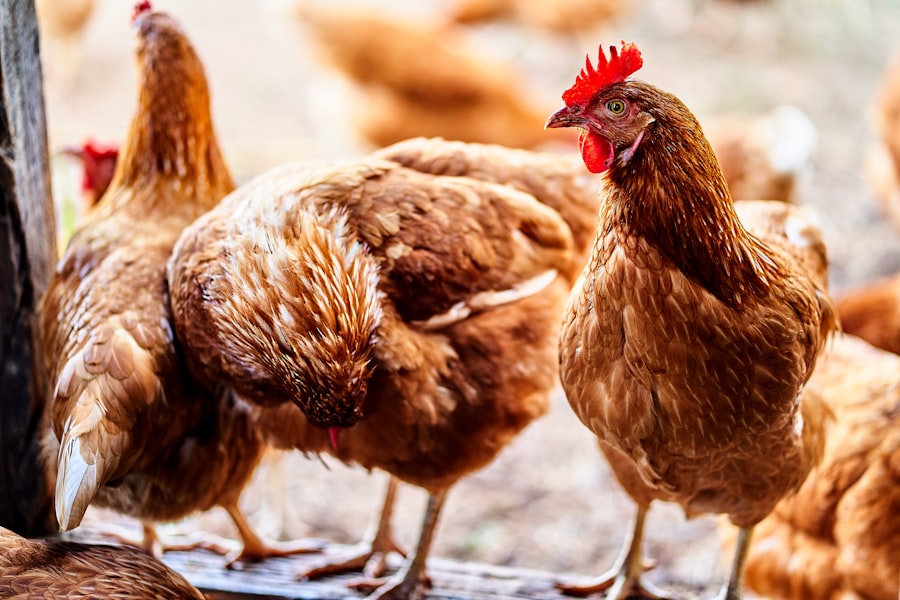Keeping chickens has become increasingly popular in recent years, as more people are becoming interested in sustainable living and producing their own food. However, it is important to provide a safe and secure environment for your chickens to thrive. This is where a chicken coop comes in. A chicken coop is a structure that provides shelter, protection, and a comfortable living space for your chickens. In this article, we will explore the importance of a chicken coop and discuss the steps to take in building and maintaining one.
Key Takeaways
- Arizona law requires chickens to be kept indoors to prevent the spread of diseases.
- A chicken coop is important for providing shelter, security, and a comfortable environment for chickens.
- There are various types of chicken coops, including stationary, mobile, and DIY options.
- Choosing the right location for your chicken coop involves considering factors such as sunlight, ventilation, and proximity to predators.
- Maintaining a clean and safe chicken coop involves regular cleaning, proper ventilation, and providing adequate food and water.
Arizona Law on Keeping Chickens Indoors
In Arizona, there are laws in place regarding the keeping of chickens indoors. According to these laws, chickens must be kept in a secure enclosure that provides protection from predators and prevents them from roaming freely. The reasons behind this law are to ensure the safety of the chickens and to prevent any potential nuisance to neighbors.
Chickens that are allowed to roam freely can cause damage to neighboring properties, such as digging up gardens or leaving droppings on sidewalks. Additionally, without proper protection, chickens are vulnerable to predators such as coyotes, raccoons, and hawks. By keeping chickens indoors in a secure enclosure, these risks can be minimized.
The Importance of a Chicken Coop
A chicken coop is essential for the health and safety of your chickens. It provides them with a sheltered space where they can rest, lay eggs, and seek refuge from extreme weather conditions. A well-designed coop will also have proper ventilation to ensure good air circulation and prevent the buildup of moisture, which can lead to respiratory issues for the chickens.
Furthermore, a chicken coop helps protect your chickens from predators. It should be built with sturdy materials and have secure doors and windows to prevent any unwanted entry. Additionally, the coop should have a fenced-in outdoor area known as a run, where the chickens can safely roam during the day while still being protected from predators.
Types of Chicken Coops
There are several types of chicken coops available, each with its own pros and cons. The most common types include traditional coops, mobile coops, and chicken tractors.
Traditional coops are stationary structures that provide a permanent home for your chickens. They are typically made of wood and have a solid roof and walls to protect the chickens from the elements. Traditional coops can be customized to fit your specific needs and can accommodate a larger number of chickens.
Mobile coops, also known as chicken arks or chicken wagons, are designed to be easily moved around your property. They often have wheels or skids attached to the bottom, allowing you to relocate the coop to different areas of your yard. Mobile coops are ideal for those who want to give their chickens access to fresh grass and insects while still providing them with a safe and secure environment.
Chicken tractors are similar to mobile coops but are designed to be moved more frequently. They are usually smaller in size and have an open bottom, allowing the chickens to forage directly on the ground. Chicken tractors are beneficial for those who want their chickens to have constant access to fresh grass and insects while also providing them with protection from predators.
Choosing the Right Location for Your Chicken Coop
When choosing a location for your chicken coop, there are several factors to consider. First and foremost, you should ensure that the coop is placed on level ground that is well-drained. This will prevent any water from pooling around the coop, which can lead to dampness and potential health issues for the chickens.
Additionally, the coop should be located in an area that receives adequate sunlight throughout the day. Sunlight is essential for the health of your chickens as it helps promote vitamin D production and prevents the growth of harmful bacteria.
Furthermore, it is important to provide enough space for your chickens. The general rule of thumb is to allow at least 4 square feet of space per chicken inside the coop and 10 square feet per chicken in the outdoor run. This will ensure that your chickens have enough room to move around comfortably and engage in natural behaviors.
Building a Chicken Coop

Building a chicken coop can be a rewarding DIY project. Here is a step-by-step guide on how to build a basic chicken coop:
1. Determine the size of your coop based on the number of chickens you plan to keep. As mentioned earlier, allow at least 4 square feet of space per chicken inside the coop.
2. Gather the necessary materials, which may include wood, screws, nails, wire mesh, roofing material, and paint or stain for finishing.
3. Prepare the site by clearing any debris and leveling the ground.
4. Build the frame of the coop using the wood and screws. Make sure it is sturdy and secure.
5. Attach the walls and roof to the frame, leaving openings for doors and windows.
6. Install wire mesh on all openings to prevent predators from entering.
7. Add nesting boxes inside the coop for your chickens to lay eggs.
8. Install roosting bars for your chickens to perch on at night.
9. Paint or stain the coop to protect it from weather damage.
10. Finally, add bedding material such as straw or wood shavings to the floor of the coop.
Maintaining a Clean and Safe Chicken Coop
Maintaining a clean and safe chicken coop is crucial for the health and well-being of your chickens. Here are some tips on how to keep your coop clean and safe:
1. Regularly remove soiled bedding and replace it with fresh bedding. This will help prevent the buildup of ammonia from chicken droppings, which can be harmful to their respiratory system.
2. Clean and disinfect the coop periodically to prevent the spread of diseases. Use a mild detergent and warm water to clean the surfaces, and then spray them with a disinfectant.
3. Provide proper ventilation in the coop to ensure good air circulation. This will help prevent the buildup of moisture and reduce the risk of respiratory issues.
4. Inspect the coop regularly for any signs of damage or wear and tear. Repair or replace any broken or damaged parts to maintain the structural integrity of the coop.
5. Secure all doors and windows to prevent predators from entering. Check for any gaps or holes in the wire mesh and repair them promptly.
Feeding and Watering Your Chickens
Proper nutrition and hydration are essential for the health of your chickens. Here are some guidelines for feeding and watering your chickens:
1. Provide a balanced diet that includes a combination of commercial chicken feed, grains, fruits, vegetables, and insects. This will ensure that your chickens receive all the necessary nutrients.
2. Use feeders that are designed specifically for chickens to prevent wastage and contamination. These feeders should be placed at a height that is comfortable for the chickens to reach.
3. Clean the feeders regularly to remove any leftover feed or debris.
4. Provide fresh water at all times. Use water containers that are specifically designed for chickens, such as nipple drinkers or waterers with a shallow dish.
5. Clean the water containers regularly to prevent the growth of bacteria.
Protecting Your Chickens from Predators
Chickens are vulnerable to a variety of predators, including coyotes, raccoons, foxes, snakes, and birds of prey. Here are some tips on how to protect your chickens from predators:
1. Ensure that your coop is built with sturdy materials and has secure doors and windows. This will prevent predators from gaining access to your chickens.
2. Install wire mesh around the perimeter of the coop and run area to create a physical barrier.
3. Bury the wire mesh at least 12 inches deep to prevent predators from digging under the fence.
4. Use motion-activated lights or alarms to deter nocturnal predators.
5. Keep the coop and run area clean and free of food scraps, as these can attract predators.
Conclusion and Final Thoughts
In conclusion, a chicken coop is an essential component of keeping chickens. It provides a safe and secure environment for your chickens to live, lay eggs, and seek refuge from predators and extreme weather conditions. By following the guidelines outlined in this article, you can ensure that your chickens are healthy and happy.
Building a chicken coop can be a rewarding DIY project that allows you to customize the coop to fit your specific needs. Remember to choose the right location for your coop, provide adequate space for your chickens, and maintain a clean and safe environment.
By taking these steps, you can enjoy the benefits of keeping chickens while also ensuring their health and safety. So why not start keeping chickens and build your own chicken coop today?
If you’re interested in learning more about the Arizona law regarding keeping pet chickens indoors, you might find this article on Poultry Wizard helpful. It provides valuable information on where to put a chicken coop, including tips on choosing the right location for your feathered friends. You can read the article here. Additionally, if you’re looking for inspiration on designing a chicken coop that complies with the law, Poultry Wizard also offers an article showcasing a beautiful chicken coop in Grand Island, NE. Check it out here. Lastly, if you’re interested in a farmhouse-style chicken coop that meets the requirements of the Arizona law, Poultry Wizard has an article featuring a charming farmhouse chicken coop design. You can find it here.
FAQs
What is the Arizona law about keeping pet chickens indoors?
According to Arizona law, it is legal to keep pet chickens indoors as long as they are kept in a clean and sanitary environment.
Do I need a permit to keep pet chickens indoors in Arizona?
No, you do not need a permit to keep pet chickens indoors in Arizona.
How many chickens can I keep indoors in Arizona?
There is no specific limit on the number of chickens you can keep indoors in Arizona, but it is recommended to keep them in a space that allows them to move around comfortably.
What are the requirements for keeping pet chickens indoors in Arizona?
The requirements for keeping pet chickens indoors in Arizona include providing them with adequate space, proper ventilation, clean and sanitary conditions, and access to food and water.
Can I keep roosters indoors in Arizona?
Yes, you can keep roosters indoors in Arizona, but it is important to note that they can be noisy and may disturb neighbors.
What are the potential health risks of keeping pet chickens indoors?
Keeping pet chickens indoors can pose health risks if proper sanitation and hygiene practices are not followed. Chickens can carry bacteria such as Salmonella, which can be transmitted to humans through contact with their feces or eggs. It is important to wash hands thoroughly after handling chickens or their eggs.
Meet Walter, the feathered-friend fanatic of Florida! Nestled in the sunshine state, Walter struts through life with his feathered companions, clucking his way to happiness. With a coop that’s fancier than a five-star hotel, he’s the Don Juan of the chicken world. When he’s not teaching his hens to do the cha-cha, you’ll find him in a heated debate with his prized rooster, Sir Clucks-a-Lot. Walter’s poultry passion is no yolk; he’s the sunny-side-up guy you never knew you needed in your flock of friends!







